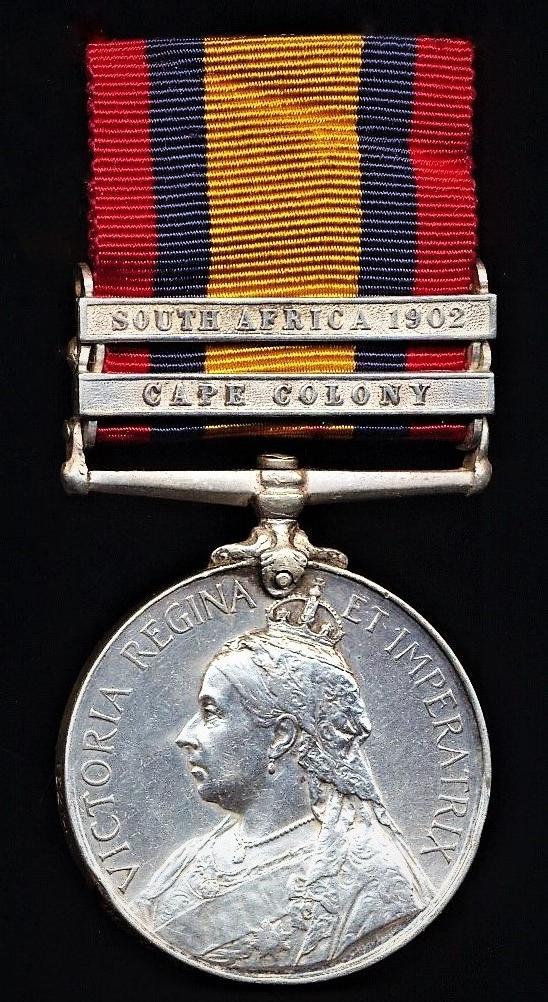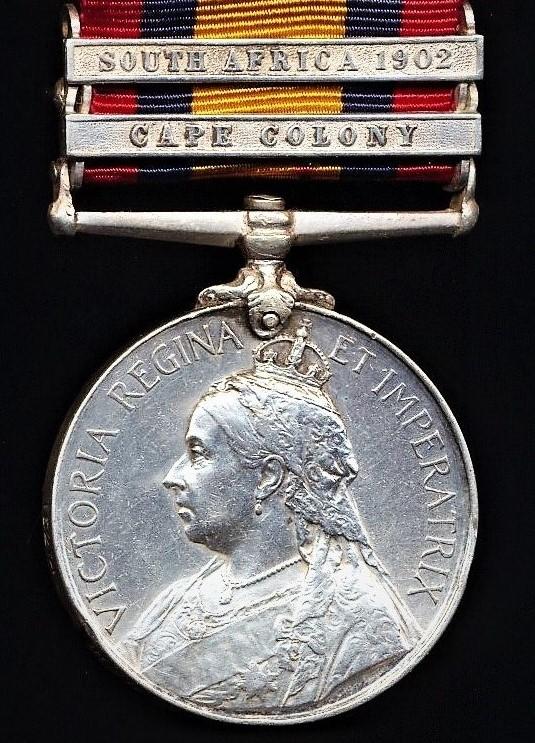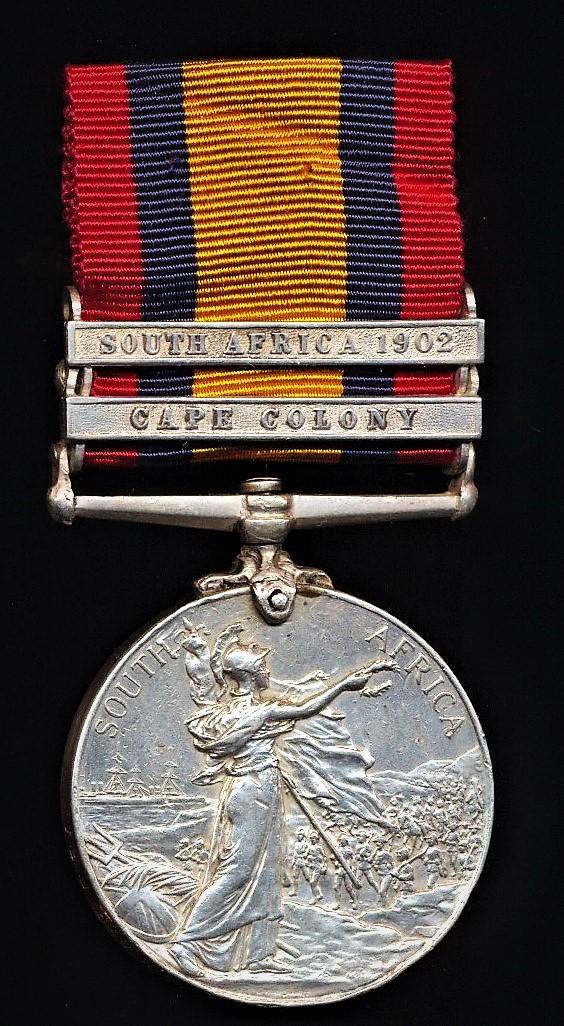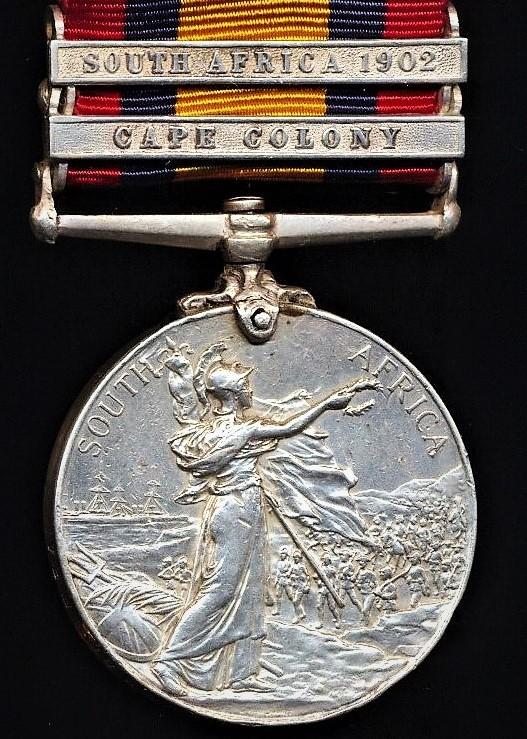Queens South Africa Medal: Queens South Africa Medal. Silver issue & 2 x clasps 'Cape Colony' & 'South Africa 1902' (15214 Gnr: W. Westwood. 76th Bty: R.F.A.)
Medal and clasps verification: Medal and 2 x clasps confirmed as issued, per respective QSA medal roll of 76th Battery Royal Field Artillery, that was compiled & signed at Bloemfontein, South Africa, on, 7 March 1903. The medal roll also shows entitlement to clasp 'Orange Free State'. Whether he was ever physically awarded a clasp 'OFS' is unknown, as the medal, official rivets & clasp carriage is as issued with no signs of a third clasp having ever been worn
Important: Gunner William Westwater, alias 'Westwood', was the centre of considerable national interest, with newspapers the length of the country publishing in March 1909, numerous articles pertaining to William's 'mysterious' fall and subsequent death from a moving train while travelling with a party of recently discharged 'Gunner's returned from overseas service in India, enroute to their homes in Scotland
The below following articles from the 'Dundee Courier' issue of 3 March 1909, are less 'sensational' than others of the period, but in our opinion provide all the salient facts
Quote,
DUNDEE SOLDIER'S FATE
IDENTITY CONFIRMED
The identity of the soldier, W. Westwood, found dying on the railway at Peterborough is believed to be cleared up as far as his Dundee connection goes.
He is thought to be William Westwater, a young man, who left Dundee to join the Artillery six or seven years ago, and whose brother resides in Kincardine Street, in the Hawkhill district.
His brother, Andrew Westwater, having fears as to the identity of the killed soldier, communicated with the hospital authorities at Peterborough, furnishing such particulars as he had concerning his brother, William.
Yesterday a letter from Peterborough Hospital secretary was received in Dundee, which stated there appeared to be little doubt the deceased soldier was William Westwater.
An envelope was found in his possession addressed "Andrew Westwater." and there was a memoriam card with the name Jane Westwater.
This card is thought to be one referring to the death of Mrs Jane Westwater, the soldier's mother, who died some five years ago. Cards were prepared at the time, and one, was sent to the son, William, who was then serving with his battery in South Africa.
No communication had been received for a considerable amount of time from the soldier, and his brother did not know he was coming home.
DID HE FALL FROM THE TRAIN?
INQUEST REVELATIONS
The inquest was held yesterday at Peterborough Infirmary.
Edward Housden, railway employee, said he found the body at 6.40 on Tuesday morning lying straight across the six-foot way. The man was alive. His boot was lying ten yards off with his neckerchief and cap. Deceased's clothing was unbuttoned. The boot was cut off with the foot.
John Cole, porter, said he rendered first aid. Deceased had a waist belt with no money, but 4d in his pocket.
Walter Upchurch, army reservist, Peterborough, identified the body as that of Gunner Westwood, 76th Battery, Royal Field Artillery. Witness, who was in the same battery, came home with deceased, landing at Southampton on February 22. All were paid off, and left Gosport on the 25th. He last saw deceased at Waterloo Station. He knew the deceased well in India. and when he left Bangalore, he only had enough money to settle with. Deceased had saved nothing. He knew as a fact at Gosport he received 10/- and a ticket to Dundee.
James Dugden, Railway Constabulary, King's Cross, said, deceased and twenty other reservists entered the 11.30 Scottish express in a reserved corridor carriage. Deceased was in the last compartment next the lavatory with three others. All were merry, but knew what they were doing. Leaving the station the men waved whisky bottles from the window. The corridor was on the platform side, and outer doors were locked, but witness could not say as to the other side. Deceased was fairly sober.
The Coroner read letters and army papers showing deceased bore a good character. He had given an address for his money to be sent to his mother in June - 7 Ruthven Road, Dundee. His officer had sent names of men who would travel North, but there would be two coaches. and the card on deceased showed his mother was dead. The War Office had wired saying the funeral expenses would be paid.
The inquest was adjourned for a fortnight for further evidence as to how he fell from the train.
Unquote.
William Westwater - alias Westwood - son of David Westwater (variously Jute Worker & Mason's Labourer) & Jane Westwater, was a native of Dundee, Forfar, Scotland, where he was born in 1882. The 1891 National Census for Scotland shows William described as a 'scholar' residing with his parents and 5 x siblings (elder brother David, elder sister Frances, younger brother Andrew & younger sisters, Carolina and Agnes) at, 14 Lyons Close, Dundee. Prior to enlisting in the British Army, at Dundee, Scotland, on, 1 March 1901, William had been employed variously as a 'Labourer & Carter' and had been residing at, 7 Blackness Road, Dundee. He had also prior served as volunteer soldier with the local Forfar & Kincardine Volunteer Artillery, which unit he had joined on 10 January 1901. On joining the regular British Army William - who had adopted the alias 'Westwood' - was posted to the Royal Regiment of Artillery, in which regiment he was assigned the regimental number 15214 and duly posted to the 76th Battery Royal Field Artillery. By the time of his death at Peterborough Infirmary on, 26 February 1909, William Westwater served a total of 7 years 363 with the British Army, as under:
- Home: 01/03/01-09/05/1902, 1 year 70 days
- South Africa: 10/05/1902-22/01/1906, 3 years 258 days
- India: 23/01/1906-23/02/1909, 3 years 32 days
- Home: 24/02/1909-26/02/1909, 3 days
Sold together with some hard copy research including a newspaper article extract
Condition: About VF
Code: 22494







